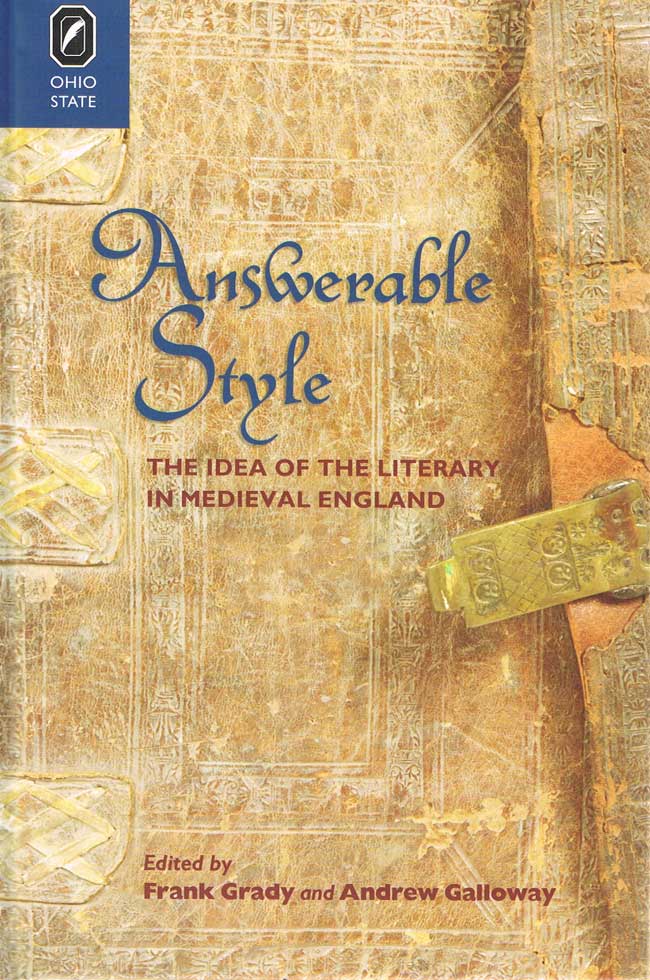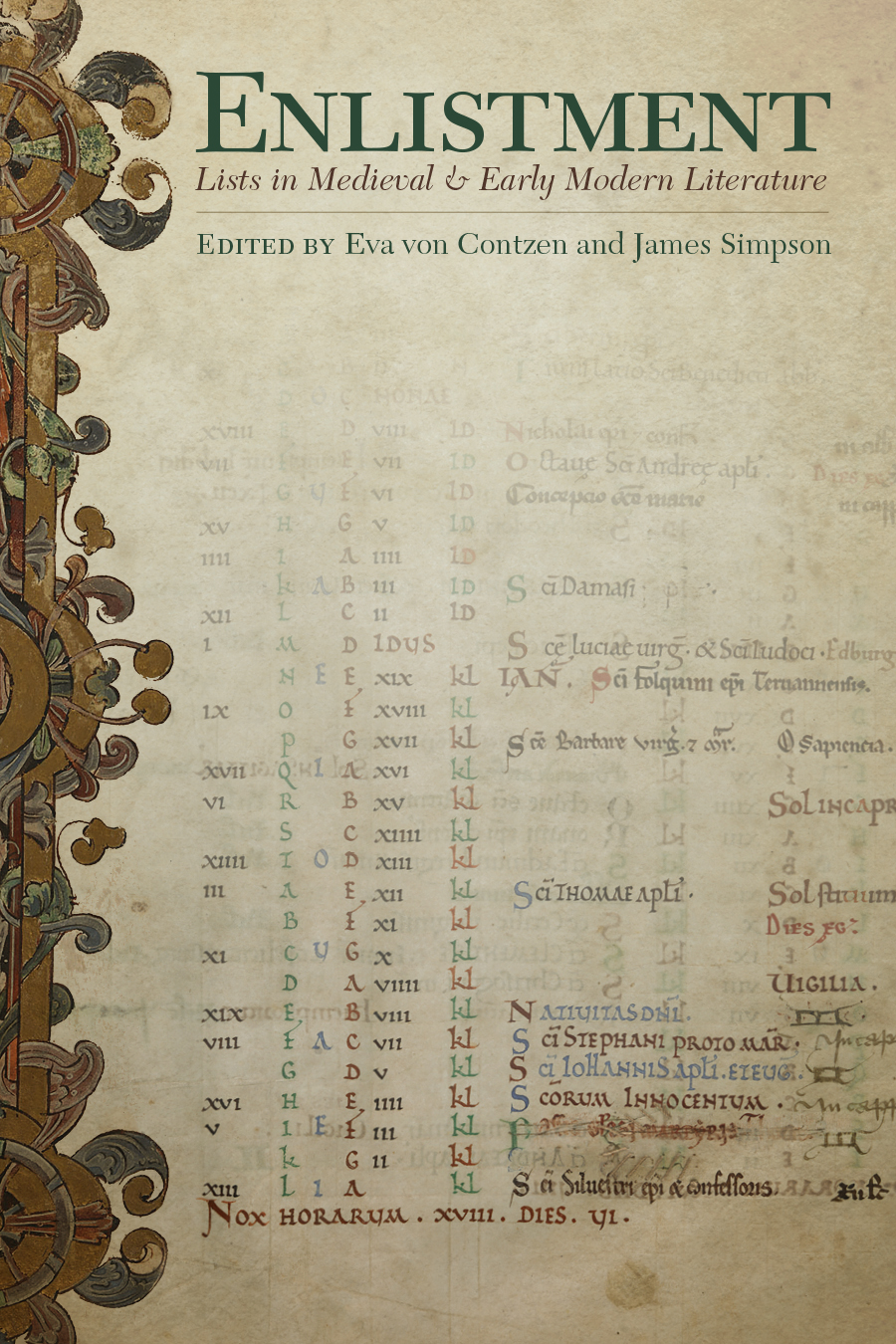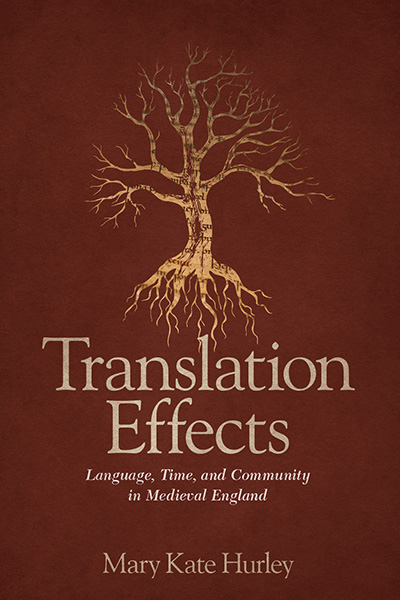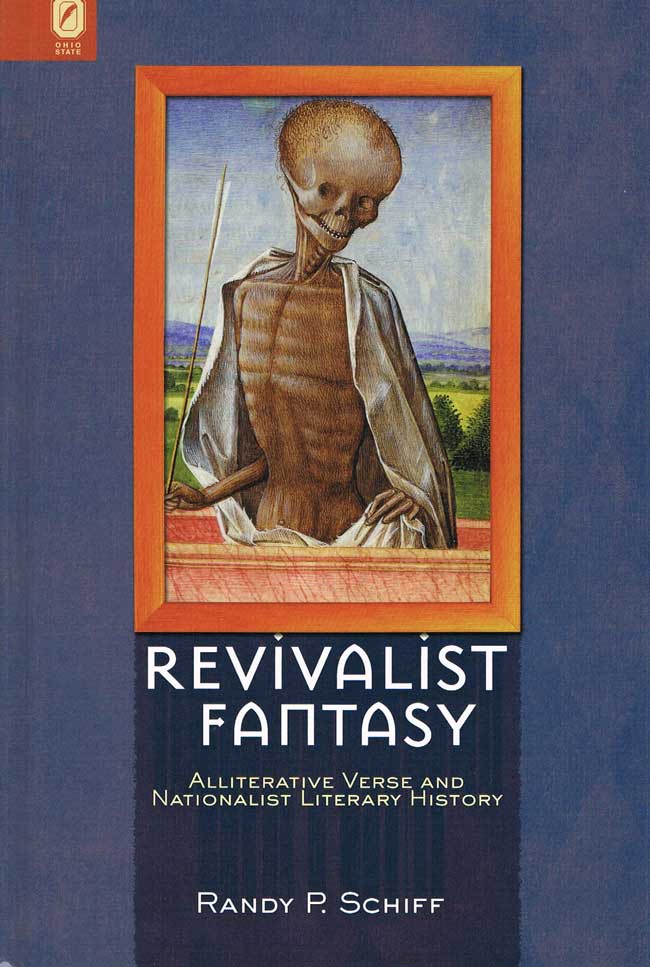“Enlistment demonstrates how a narrow focus on one formal feature like the list can generate newly illuminating constellations of diverse texts … This volume establishes an exciting new area for the study of form as a mode of literary and political experimentation that ought to inspire further research on lists and their implications across various media, including literary, graphic, and musical arts.” —William Rhodes, Review of English Studies
“This fine collection of essays … offers an informative and engaging examination of the list across a range of textual genres and literary contexts from Old English to Edmund Spenser. The introduction provides a critical history and theoretical overview of textual enlistment, which, in its thoroughness and breadth, will be invaluable to future studies of this subject.” —John Joseph Gallagher, Forum for Modern Language Studies
“This fascinating volume rightly pauses over the important literary and broadly cultural work of listing. Its focus is on literary and formal considerations primarily, though clearly its approaches have application to compilatory practices more broadly, including cataloguing, collecting, and the secondary uses to which lists are put … This rich and engaging volume has more than started that discussion.” —Michael Van Dussen, Arthuriana
“Thought-provoking . . . the essays in this collection go a long way to displaying just how creative the use of lists was by the texts presented . . . The collection makes rewarding reading for literary critics and historians working on the periods discussed in this volume (and, frankly, scholars working on other literary traditions and periods will also benefit from diving into these essays).” —Ray Schrire, Modern Philology
Bestiaries. Lapidaries. Lunaries. Inventories and household vocabularies. Lists are everywhere in medieval and early modern texts––evidence of the need to manage and order knowledge and experience. Yet until now, listing as a formal practice has received scant scholarly attention. In Enlistment, foremost medievalists and early modernists from both the Anglo-American and German traditions investigate the humble list as a platform for better understanding how and why lists captivated period audiences. From epic catalogues of trees in Geoffrey Chaucer and Edmund Spenser to genealogies and the names of the divine, the lists in question come from a variety of periods, languages, and genres. Throughout, contributors demonstrate how lists have the curious capacity to challenge our categories of thinking and ordering of the world. The lists we encounter in medieval and early modern literature can thus be seen as seismographs of cultural knowledge and also as testing grounds for defining the ineffable, or unfathomable, or that which would be dangerous if otherwise expressed.
Contributors: Suzanne Conklin Akbari, Ingo Berensmeyer, Eva von Contzen, Alex Davis, Andrew James Johnston, Wolfram R. Keller, Alexis Kellner Becker, Kathryn Mogk Wagner, Martha Rust, James Simpson
“[Enlistment] succeeds in its aim of positing the medieval and early modern list as something to be thought with, about, and through.” —David Matthews, Speculum
“Thoroughly enjoyable and thought-provoking … Enlistment is a welcome addition to the growing field of Medieval Informatics and Information Studies.” —Tekla Bude, Journal of English and German Philology
“Enlistment asks the question of what lists can ‘do’ as a kind of speech act as well as what poetic and cultural issues they indicate, all with a rigor and range that have not previously been attempted. With impressive scope and clarity, this volume makes an important contribution to medieval and early modern literary studies.” —Andrew Galloway, author of The Penn Commentary on Piers Plowman, Volume 1
Eva von Contzen is Professor of English Literature at the University of Freiburg. She is also the author of The Scottish Legendary: Towards a Poetics of Hagiographic Narration.
James Simpson is the Donald P. and Katherine B. Loker Professor of English at Harvard University and author of several books, including Permanent Revolution: The Reformation and the Illiberal Roots of Liberalism.
Contents
List of Illustrations
Introduction Enlistment as Poetic Stratagem
Eva von Contzen and James Simpson
Chapter 1 “He should not overlook anything that could ever be of significance”: Knowledge and Vocabulary in Gerefa
Alexis Kellner Becker
Chapter 2 In the Space of a List—Widsith’s Global Modernism
Andrew James Johnston
Chapter 3 Listing Divine Names: A Study in Liturgical Form
Kathryn Mogk Wagner
Chapter 4 Naming the Children of Jacob: The Shape of Negative Theology in the Benjamin Minor
Suzanne Conklin Akbari
Chapter 5
Out of Eden and Back Again: Following the Flow of Concepts, Categories, and Lists in the Four Rivers of Paradise
Martha D. Rust
Chapter 6 Epic Lists: The Matter of Troy and the Catalogue Form in Middle English Literature
Eva von Contzen
Chapter 7 Performing Generic Exhaustion: Implosive Households in Gavin Douglas’s Palice of Honour
Wolfram R. Keller
Chapter 8 The Epic Tree Catalogue from Chaucer to Spenser
Ingo Berensmeyer
Chapter 9 What’s in a List? Erasmus, Cromwell, Bale
Alex Davis
Chapter 10 Reformation Lists: Syntax, the Sacred, and the Production of Junk
James Simpson
List of Contributors
Index
Related Titles:

Answerable Style
The Idea of the Literary in Medieval England
Edited by Frank Grady and Andrew Galloway




